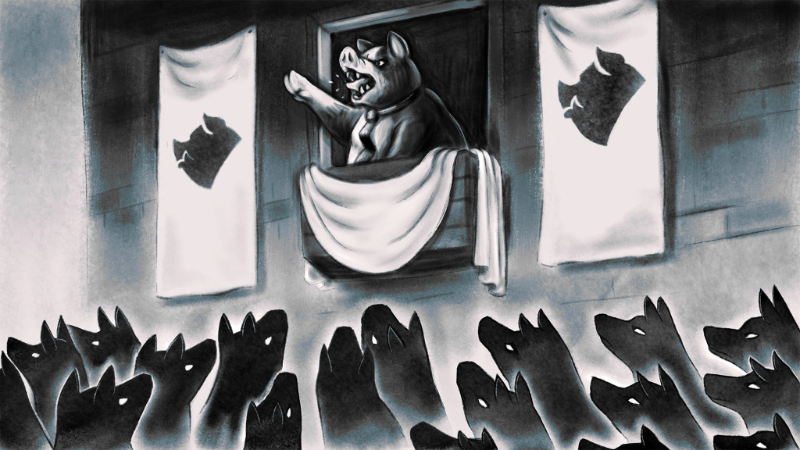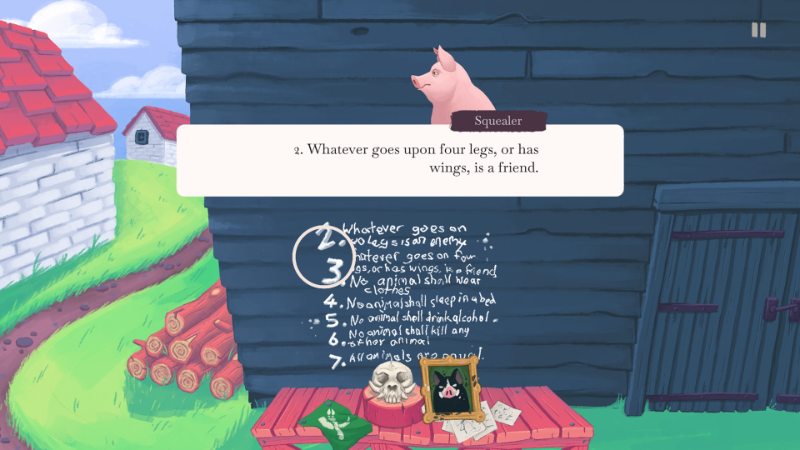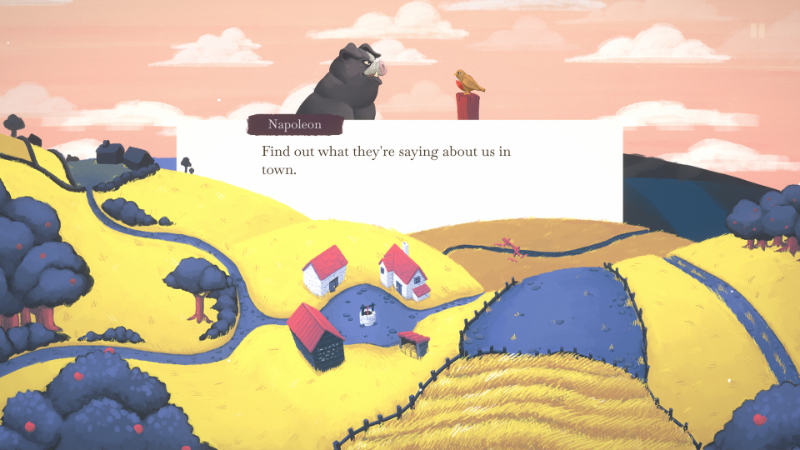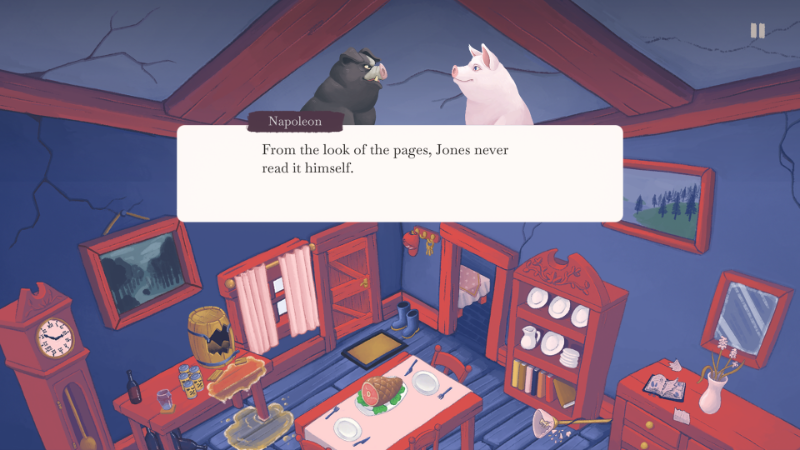“All animals are equal, but some animals are more equal than others.” You may not have read George Orwell’s condemnatory 1945 allegory about the rise of Stalinism, but you probably still know its most famous quote.
For decades, the superficially childlike tale of animals overthrowing their farmer landlord — only to descend into their own newfound chaos amid a leadership vacuum — has been used as a benchmark of critical post-Russian Revolution literature, but its broader message of the corrupting influence of power is timeless.
For that reason, a video game adaptation of Animal Farm has potential, even if it seems an odd project, and the collective at The Dairymen and Nerial found just the route to deliver such an idea.
Orwell’s Animal Farm Review: Cultivating Something Special
Orwell’s Animal Farm isn’t a page-by-page reenactment of the decades-old story, but sometimes it may seem that way. I suppose for those that missed it before now, a spoiler warning is justified even for a book from 1945. I’ll tread lightly.
Its intro unavoidably opens like the novel — anthropomorphic farm animals call for an uprising and cast out the farmer they believe has been a bad leader and worse caretaker. His sudden removal leaves a void, and through conflicting ideals, the animals’ once-rose-tinted view of the future descends into chaos as allegiances form, betrayers emerge, and even wars ignite.
Like the book, the game takes seriously the juxtaposition of cutesy farm animals with names like Snowball and Squealer and the political ideals they represent. It would maybe be interesting to faithfully retell the story exactly as it occurred, but Orwell’s Animal Farm thankfully dares to do something more.
Though it is essentially a text adventure, there are in Orwell’s Animal Farm strategy elements to consider, such as determining who plows the fields, deciding whether the cows distribute their milk to other species, and what to do with excess hay for the winter. Each of these decisions and more are laid out with gorgeous original artwork, still and simple, but lovely nonetheless.
You’re given free control over the direction Animal Farm heads in, but after an optimistic honeymooning period with your new government of Animalism, things tend to fall apart.
Every decision feels like it has enormous weight to it. You’ll never comfortably see through the decision matrix and know how to keep all your residents happy, and more likely, you’ll soon find yourself alienating your comrades — or worse, driving them off the farm or to their deaths.
Each would-be puerile predicament carries the usually overt but still interesting political overtones. Even after multiple playthroughs, the game has its share of surprises, and it’s possible to head down a totally new path for your farm, only to painfully end up back on the rails headed for disaster, like a train wreck you see coming. It’s really sad when that happens.
I think even if you haven’t read the book, the game does a great job of introducing the many characters and causing you to feel for their needs and wants equally, at least at first. You know what they say about equality on Animal Farm, after all.
By setting up a gameplay loop like that seen in Reigns and other political text adventures, Orwell’s Animal Farm allows players to sometimes retell, but more often reshape, classic literature in a way that never wavers from the core beliefs espoused in the book. Power corrupts.
Animal Farm reminds us of this with its bleak ending, once meant to tell readers what happened next under Stalin, but you can find yourself just as doomed following different economic and political ideals on the Animal Farm.
For my first few runs of the game, which is played in up to seven-year chunks — a couple of gameplay hours each — I was beginning to think that despite many alternate endings, none of them would be any more optimistic than the original story’s. I still actually haven’t found one that is, though I’ve seen hints that they are attainable, and I love the game for that elusiveness.
It reminds me of another quote, attributed usually to Ben Franklin, where he promised the United States would have “a democracy, if you can keep it.” That caveat has never felt more present than in these last few years, and we’ve seen firsthand how delicate our governance truly is. As we seem to now be coming out of the other side of a half-decade of borderline constitutional crises, it’s unnerving and dazzling at once to see a game portray this delicacy so well. It’s even more impressive to see it comes from a game that dares to rewrite classic lit in the process.
On top of remarkably recreating the time and place of Animal Farm so well through well-considered rewrites and period-specific art, the game also manages to maintain a high bar for its mood by using some excellently delivered narration and original music that feels of a piece with the era seen in the game. For a game that is mostly just text on top of pretty pictures, it is much more immersive than I expected.
Like reading a book with choose-your-own-adventure continuity, the story can occasionally trip on itself. I never saw any of my choices betrayed, but several times I did see moments play out twice in close proximity to one another in a way that implied the game bounced off its own lofty story branches. This can be jarring, but because it never broke my own continuity, I feel it’s a mostly forgivable flaw in an otherwise unique and fascinating game.
Orwell’s Animal Farm Review — The Bottom Line
Pros
- Dares to reimagine classic lit — and nails it
- Great narration, music, and art set the scene
- Captures the fragility of effective governance just as we’re seeing it so much in real life
Cons
- Sometimes replays scenes like a CYA novel backtracking on itself
Orwell’s Animal Farm is destined to fly under the radar this December, sharing a launch date with the biggest game of the year. It doesn’t help that many people simply won’t be interested in playing a game that both plays like and is based on a book. But there’s absolutely an audience for this game, and if you find yourself in it, Orwell’s Animal Farm is a timely, effective reimagining of one of the last century’s most notable allegories.
I don’t know how often games can successfully rethink classic literature from decades ago, but it definitely worked this time.
[Note: The Dairymen provided the copy of Orwell’s Animal Farm used for this review.]











Published: Dec 10, 2020 01:55 am